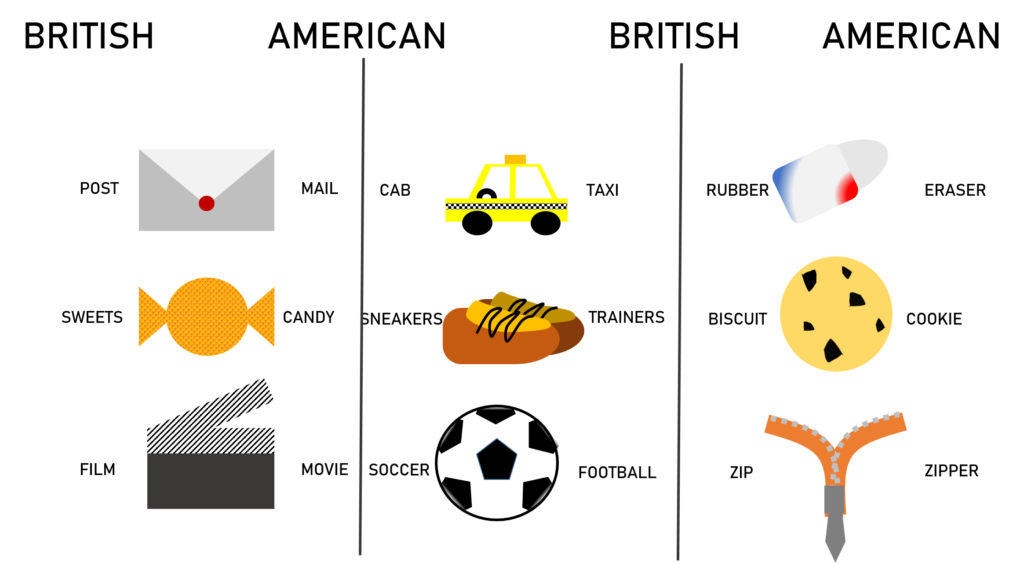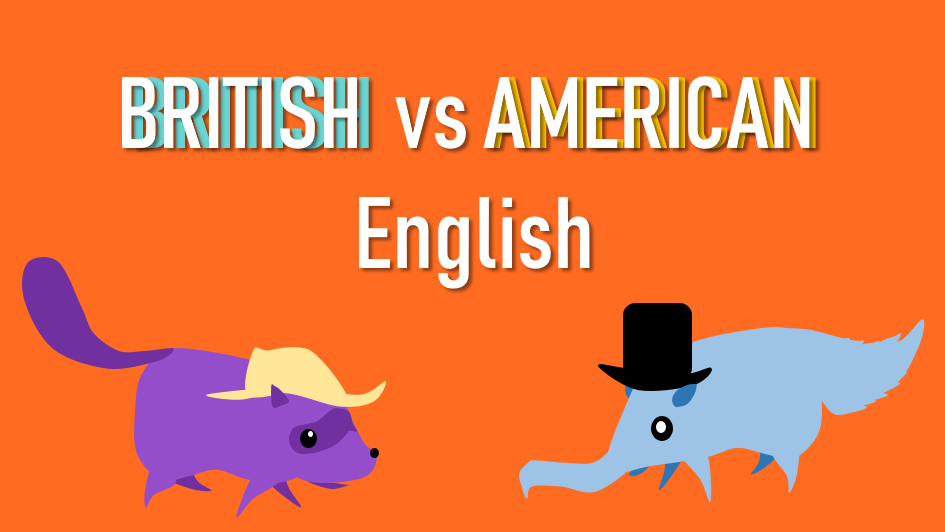History
The British introduced their language to Americans when they arrived on the continent across the Atlantic ocean in the 16th century. A large portion of North America’s continent was under the British rule for a rather long time, thus the language became deeply rooted in the land and now is widely spoken all around the United States, although not considered an official language, and Canada, where it is an official language alongside French.
Two languages or one?
Because of the timeline when the language was introduced to Americans, that is during the 16th and 17th centuries, when the language was not yet standardized, Americans began applying their own rules to various parts of the language.
The spelling and the pronunciation of many words became different as well as some words changed meaning and new words were invented that later replaced traditionally English words that came from Europe. It is theorized that many of the changes made to the language was a way of seeking independence from the British rule, although not all of these claims are justified and many of the changes were part of the natural language acquisition process, which could not be supervised by British language experts.
Despite the differences made in various parts of the language, American and British English are still the same language. They are considered to be two different variants of the same language and are not the only to be found around the globe. Other well-known variants of the English include Canadian English, Australian English, Indian English, Jamaican English and others. In fact, even in the United Kingdom itself, British English is not the only variant of the language to be used and there are many different dialects spoken across the country including Scottish, Welsh and Irish.
Pronunciation differences
As already mentioned, the United Kingdom itself is full of very different variations of the English language therefore the grammar, vocabulary and pronunciation varies within the country not only outside of it. The same can be said of America which is an even larger country where the language saturated so differently that even more variations of the spoken and written (but especially spoken) English were born.
But there is one key difference between the American and British English. The pronunciation of the ‘r’ sound. British only tend to pronounce the sound ‘r’ when it is at the beginning of the word (mostly anyway), while Americans choose to pronounce the ‘r’ in other parts of the word as well.
In words like car, bar or star the r is distinctly defined by an American accent which rolls the ‘r’ sound off the tongue loud and clear, while the British may choose to leave the word with an open ‘aaah’ ending.
Vocabulary differences
While being considered one language, some of the words may vary greatly depending on whether you are in the US or in the UK. The changes that were made possible through assimilation with local languages and different leads in language formation remain present in the language today. Check out some of the biggest differences between British and American English vocabulary below.


Take our British VS American English language quiz by clicking here.
Spelling differences
Although many words in both variants of the language have just slight changes that are singular and not found in many words but there are also several common themes among spelling differences in words.
The -t ending turns into -ed ending. The irregular verbs are quite hard to get a grasp on for non-native speakers. But their acquisition is made even harder by the varying ending. While some might be taught that the -t ending in the past form of the verb is interchangeable with the -ed ending, that is not entirely true. These two different variations depend on whether you are learning British English or American English.
A quite strange change has occurred with -ence/-ense endings and -ise/-ize endings. While the British English variant users tend to employ the -ence ending in words like licence or offence, Americans may choose to use a much softer sounding ending of -ense: license or offense. This is not particularly strange on its own, but when put together with the -ise/-ize ending, in words like organise or appetise, it becomes peculiar. While the letter ‘c’ is much sharper than the letter ‘s’, with which it was replaced in the American variant, the letter ‘z’ is much sharper, thus going against the seemingly set tendency that the American English employs sharper sounds. There is no real explanation as to why this is the case and it is probably best not to look for these systematic tendencies when trying to learn a language but rather stick to a chosen variant for less complications and a smoother acquisition process.
Is it centre or center? Fibre or fiber? Well, depending on where you are in the world it might be either. Although the difference between these two words is virtually non-existent and simply depends on preference, some people may choose to employ the -re when describing places (like a language centre) and -er for concepts (like center – the middle of something)
Double l vs single l, ou vs o, ogue vs og and so on… notice how there are fewer letters in the American variant? There is a theory that this was done due to the fact that when writing in American newspapers the cost of an article was determined per letter and wanting to save a little bit of money, American writers got rid of unnecessary letters that did not change the word too much as to not be recognizable. However, that is just a theory and either of the variants are now accepted in all parts of the world.
Which should you use?
There is no real case built for choosing one English variant over the other. You do not even have to pick between the two as there are so many more. It is important to remember that it is still the same language and therefore you will be learning most of the same rules, vocabulary and the greatest difference comes with culture so the choice is entirely up to you as using one or other variation will most likely not cause a miscommunication.
However, if you need some points to consider before choosing which variant to settle on, here are several:
- The US is the largest English speaking country in the world, The UK is only the 6th! That means that there are approximately 230 000 000 more American English speakers than British speakers.
- British English is usually considered more formal and tends to employ words such as ‘shall’ that are considered more or less outdated by American English speakers and replaced with ‘will’ or ‘should’.
- The standard for most English teaching Institutions not located in America is the British English variant.
- Both of these variants can get you the results you desire!
Click here to sign up for our weekly lessons and start your education journey today!
